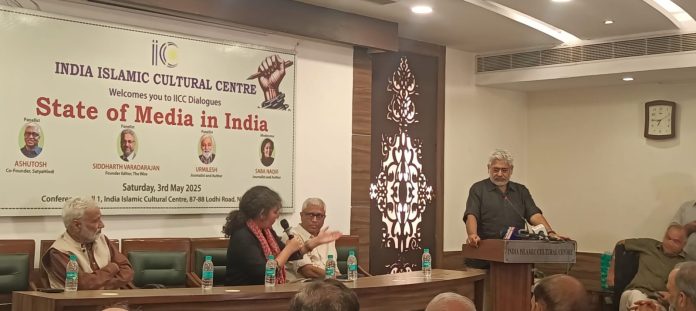– Mohd.Naushad Khan
The India Islamic Cultural Centre (IICC), under its “IICC Dialogues” initiative, held a public meeting on Saturday titled “State of Media in India”. The event, held to mark World Press Freedom Day, featured prominent voices of dissent and alternate media.
The panel included Siddharth Varadarajan, founding Editor of The Wire, Ashutosh, Co-founder of SatyaHindi, and Urmilesh, a senior journalist and author. The session was moderated by senior journalist and author Saba Naqvi, and conducted by BBC journalist Iqbal Ahmed.
Speaking at the event, Siddharth Varadarajan said Narendra Modi, who became Prime Minister in 2014, cannot erase his past. He recalled Modi’s statement to international media after the Gujarat riots, where Modi said his only regret was failing to manage the media. Since then, Varadarajan noted, Modi has succeeded in managing the press.
He mentioned journalists being targeted, especially in Kashmir and cases like Siddique Kappan, calling it a state strategy to silence the media. He emphasized that digital platforms are gaining more viewership, unlike mainstream media, which spreads hate and communal narratives.
Ashutosh criticized the government narrative of being in “Amrit Kaal”. He said that hate has spread across all institutions, and blamed the State for this. He stated the change post-2014 was not routine but transformative — like 1947 — transferring power from Manmohan Singh to Narendra Modi, with Hindutva ideology replacing earlier norms.
He questioned why earlier leadership changes — like those under Atal Bihari Vajpayee, H.D. Deve Gowda, or I.K. Gujral — didn’t bring such a shift. He blamed the emergence of a Hindu Rashtra-driven State for the current crisis.
Urmilesh pointed to India’s declining rank in the World Press Freedom Index. He said media freedom and democracy are deeply connected — stronger democracy ensures a freer press. He urged the public to support independent media platforms to help protect democracy.




